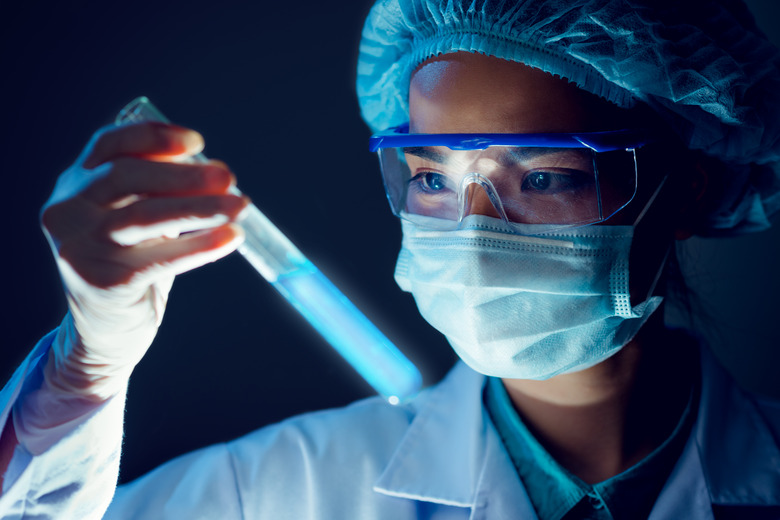Do And Don't In The Science Lab
Though learning real science can be fun and exciting, hazards might also be lurking in many lab situations. Pay close attention to the safety practices that go with your lab activities, such as handling chemicals and glassware or using machinery. Always wear personal protective equipment (PPE) when the situation calls for it. Above all, stay safe and healthy as you explore the mysteries of science.
Do Wear Eye Protection
Do Wear Eye Protection
Science labs contain glassware, caustic chemicals, vapors, open flames and other substances that may harm your eyes. Goggles or safety glasses help protect your eyes in case of accidents or spills.
Do Practice Fire Safety
Do Practice Fire Safety
Open flames from Bunsen burners or alcohol lamps are necessary for experiments that involve heating, boiling and burning chemicals or other specimens. Keep your hands and arms away from the open flames, wear safety glasses, tuck in loose clothing, and keep long hair tied back.
Do Handle Glassware Safely
Do Handle Glassware Safely
Eliminate potentially dangerous chemical reactions by thoroughly washing beakers, test tubes, flasks and other glassware before and after use. This also helps ensure that results are not tainted by chemical residue from previous experiments. Glassware can break, leaving behind potentially harmful shards. Report any broken glass immediately and dispose of it properly.
Do Keep Notes
Do Keep Notes
Write proper laboratory procedures, observations and instructions in a laboratory notebook, with permanent binding and large pages. Lab notebooks help keep track of data, maintain records of experiments and facilitate thinking.
Do Wear Gloves
Do Wear Gloves
Protect your hands with the proper gloves for each job. Handle hot and cold items with insulated gloves, wear latex gloves during dissections, and use chemical-resistant gloves when working with caustic chemicals.
Do Wear Closed-Toed Shoes
Do Wear Closed-Toed Shoes
Protect your feet from spills, hot items and heavy objects by wearing shoes with closed toes. Sandals and other open-toed footwear leave your feet vulnerable to burns and broken bones.
Do Practice Electrical Safety
Do Practice Electrical Safety
Some experiments require electrical equipment. Before plugging in anything, make sure the plug includes a ground prong. Whenever plugging or unplugging equipment, hold the plug by its insulating cover. Never unplug anything by pulling or tugging the cord. Reduce the risk of shock or shorts by keeping electrical equipment away from water and other liquids.
Don't Eat or Drink in the Lab
Don't Eat or Drink in the Lab
Eat before entering or after leaving the lab. Food, gum, mints, cough drops and beverages are messy. They may get equipment dirty, contaminate samples, absorb chemicals or cause accidents.
Don't Use Excessive Force
Don't Use Excessive Force
Some experiments require connecting glassware with glass tubes and rubber grommets or plugging glassware with stoppers. Using excessive force can potentially chip or break the glass.
Don't Leave A Mess
Don't Leave A Mess
Clean up spills immediately. Cover the spill with paper towels and then wipe it up from the outside in, pushing the mess toward the center of the table, rather than the floor. Dispose of the paper towels in a proper container. Clean up all laboratory equipment, materials, supplies and work surfaces before leaving the lab. Make sure Bunsen burners and other sources of heat or gas are properly turned off.
References
- "Science Safety Handbook"; California Department of Education; 1999
- United Federation of Teachers: Lab Safety Rules for Students
- Northern Illinois University: General Safety Rules
Cite This Article
MLA
III, Frank B. Chavez. "Do And Don't In The Science Lab" sciencing.com, https://www.sciencing.com/dos-donts-science-lab-4896/. 26 April 2018.
APA
III, Frank B. Chavez. (2018, April 26). Do And Don't In The Science Lab. sciencing.com. Retrieved from https://www.sciencing.com/dos-donts-science-lab-4896/
Chicago
III, Frank B. Chavez. Do And Don't In The Science Lab last modified August 30, 2022. https://www.sciencing.com/dos-donts-science-lab-4896/
